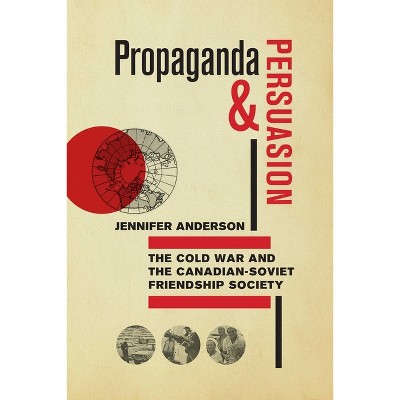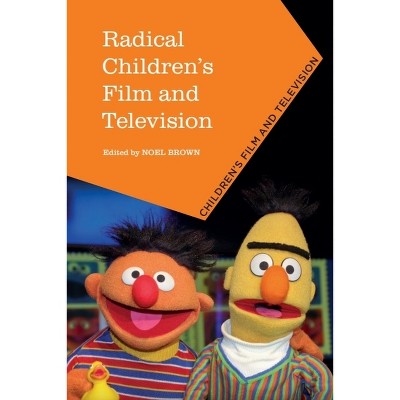Sponsored

Media, Persuasion and Propaganda - (Media Topics) by Marshall Soules (Paperback)
In Stock
Sponsored
About this item
Highlights
- Living in a saturated media environment, we are crowded from all sides by persuasive messages and information.
- About the Author: Marshall Soules is former Chair of the Media Studies Department at Vancouver Island University teaching across a range of media studies and media theory topics, including propaganda.
- 304 Pages
- Performing Arts, Film
- Series Name: Media Topics
Description
About the Book
Using case studies and exercises, this innovative study guides the reader through the many varieties of persuasion and its performance, exploring the protocols of rhetoric unique to the medium, from orality and print to film and digital images.
Book Synopsis
Living in a saturated media environment, we are crowded from all sides by persuasive messages and information. Advice, promotion and propaganda form a spectrum of persuasion, and everywhere we see it performed in its full theatricality, complete with actors, scripts, props and costumes.
Based on enduring rhetorical principles, these persuasive techniques and the psychology behind them have become increasingly sophisticated during the 'age of persuasion', a century of applied research in advertising, advocacy, public relations, mass entertainment and social control. Media, Persuasion and Propaganda guides the reader through the many varieties of persuasion and its performance, exploring the protocols of rhetoric unique to the medium, from orality and print to film and digital images. Using case studies and exercises, this innovative study poses challenging questions, such as: How do individuals and organisations exert influence to build communities and networks? What role do media play in communicating persuasive messages? How do we use recent discoveries in cognitive science to promote a cause, advocate social change or market ideas and products? How do we defend ourselves against manipulation and undue influence, and when does persuasion turn into propaganda?
From the Back Cover
Living in a saturated media environment, we are crowded from all sides by persuasive messages and information. Advice, promotion and propaganda form a spectrum of persuasion and everywhere we see it performed in its full theatricality, complete with actors, scripts, props and costumes. Based on enduring rhetorical principles, these persuasive techniques and the psychology behind them have become increasingly sophisticated during the 'age of persuasion', a century of applied research in advertising, advocacy, public relations, mass entertainment and social control. Media, Persuasion and Propaganda guides the reader through the many varieties of persuasion and its performance, exploring the protocols of rhetoric unique to the medium, from orality and print to film and digital images. Using case studies and exercises, this innovative study poses challenging questions, such as: How do individuals and organisations exert influence to build communities and networks? What role do media play in communicating persuasive messages? How do we use recent discoveries in cognitive science to promote a cause, advocate social change or market ideas and products? How do we defend ourselves against manipulation and undue influence, and when does persuasion turn into propaganda? Marshall Soules is the founder and former Chair of the Media Studies Department at Vancouver Island University. In 2011, he was awarded an Outstanding Service Award at VIU for his contributions to the field of Communications and Media Studies. Previous publications reflect his interest in performance, improvisation, digital media, and street art.Review Quotes
This new text will be welcomed for its comprehensiveness and for the sheer density of information distilled from an extraordinarily complete bibliography running to more than 730 titles. The many examples and case studies used to illustrate theoretical issues are often as fresh as today's news, and each chapter ends with a list of genuinely useful exercises for students. The writing is admirably clear throughout. Issues of ethics in communication form a thread that runs through the text and Soules, in the realist tradition of the best of critical theorists, tackles head-on the often difficult questions raised.--Dr Wade Rowland, York University, Toronto
About the Author
Marshall Soules is former Chair of the Media Studies Department at Vancouver Island University teaching across a range of media studies and media theory topics, including propaganda.
Shipping details
Return details
Frequently bought together

Trending Non-Fiction
















